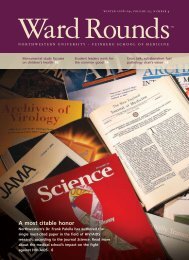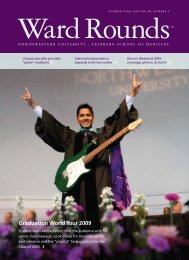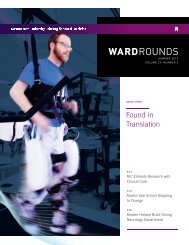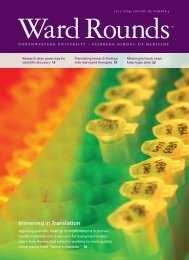Download PDF - Ward Rounds - Northwestern University
Download PDF - Ward Rounds - Northwestern University
Download PDF - Ward Rounds - Northwestern University
Create successful ePaper yourself
Turn your PDF publications into a flip-book with our unique Google optimized e-Paper software.
DEAN’S MESSAGE WARD ROUNDS NEWS RESEARCH FEATURES ALUMNI NEWS PROGRESS NOTES UPCOMING EVENTS<br />
online extras<br />
Article Detail:<br />
The NFL Head, Neck and<br />
Spine Medical Committee<br />
tackles the job of reducing<br />
the long-term cognitive<br />
effects of head trauma<br />
Additional Info:<br />
content & reply to this<br />
article at :<br />
wardrounds.northwestern.edu/<br />
winter-2010-11/features/<br />
confronting-concussions<br />
topic :<br />
written by :<br />
photography by :<br />
chicago bears linebacker hunter hillenmeyer tackles an<br />
opponent in a game against the philadelphia eagles.<br />
Sports Medicine<br />
Devon McPhee<br />
Courtesy of AP Images and Bill Smith<br />
Chicago Bears linebacker Hunter Hillenmeyer,<br />
MBA ’10, did not want to remain<br />
on injured reserve for the entire 2010<br />
football season, causing him to miss the<br />
recent NFC Championship game against<br />
the Green Bay Packers. Five years ago,<br />
if he had sustained the same injury, he<br />
most likely would not have.<br />
Hillenmeyer suff ered a concussion<br />
during a preseason game against the<br />
Arizona Cardinals. He passed all required<br />
medical tests and returned to play in the<br />
team’s season opener against Detroit,<br />
but was removed at halſt ime because he<br />
felt lingering symptoms from his injury.<br />
Bears’ head coach Lovie Smith and the<br />
team’s doctors then decided it was in the<br />
linebacker’s best interest to sit out the<br />
remainder of the year.<br />
“It was diffi cult for me to hear because<br />
I love playing football, but I respected<br />
their decision,” Hillenmeyer says.<br />
The caution taken by the team with<br />
regard to Hillenmeyer’s concussion<br />
marks a shiſt in the National Football<br />
League (NFL)’s attitude.<br />
Once seen as a relatively mild injury<br />
in a world of blown kneecaps and<br />
separated shoulders, recent research<br />
about the long-term eff ects of chronic<br />
head trauma, coupled with high-profi le<br />
coverage of football players suff ering –<br />
and dying, sometimes by their own<br />
hand – from symptoms now associated<br />
with the disease, has encouraged the<br />
organization to rethink its approach.<br />
Hunt Batjer, MD, Michael J. Marchese<br />
Professor of Neurological Surgery and<br />
chair of the Department of Neurological<br />
Surgery at <strong>Northwestern</strong> <strong>University</strong><br />
Feinberg School of Medicine, co-chairs the<br />
committee charged with understanding<br />
the long-term eff ects of concussions and<br />
providing treatment recommendations<br />
to the league.<br />
The NFL named Batjer and Richard<br />
G. Ellenbogen, MD, chairman of Neurological<br />
Surgery at the <strong>University</strong> of<br />
Washington School of Medicine, codirectors<br />
of its Head, Neck and Spine<br />
Medical Committee in March 2010.<br />
As co-chair, Batjer assists the NFL<br />
with its role in the research, education,<br />
prevention, and treatment of head and<br />
ward rounds winter 2010-11 — p.11












